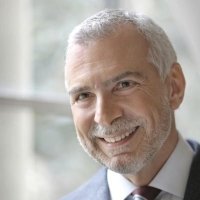The EU, U.S. and NATO: Partners for Global Security
In response to the unprovoked and unjustified Russian invasion of Ukraine, transatlantic partners are jointly supporting Ukraine and responding to Putin’s aggression. Following President Biden’s visit to Brussels, the Secretary General of the European External Action Service (EEAS) Stefano Sannino joins us for a discussion on the EU response to the Russian invasion, the recently adopted EU Strategic Compass, and the EU-U.S.-NATO partnership to address key global challenges. The discussion was chaired by Robin Quinville, a senior diplomat and former Chargé d’Affaires at the U.S. Embassy in Berlin.
Selected Quotes
Stefano Sannino
“The aggression of Russia against Ukraine has generated a sense and need of unity within the European Union and between the European Union and the United States; and I would say the transatlantic community more in general... And, from a certain point of view in Europe, it has been quite unique how we have managed—very easily—to agree on this very substantial package of sanctions, but also on the decision to use our financial instruments to support the supply of arms to Ukraine to defend against the attack. That’s also something that they had not done before and that’s the other important element to underline: the opening of our borders to the flow of refugees—more than three and a half million that have come to Europe—and they have created, in just a few weeks, this very strong sense of solidarity.”
“They (the EU) want to stress that the investment in the military capabilities will remain and will belong to the member states. We are not speaking here about creating a new European structure, but to facilitate our member states to develop these plans and then… these capabilities can be used both in a NATO environment or in a European Union environment. So, in a way, it is a way of strengthening, also the NATO alliance, and the participation of the European Union to meet.”
“On the chapter of the action that we need to take (regarding the EU Strategic Compass), we will need to work on creating the conditions for this rapid deployment capabilities to be able to come in. So, the idea is that of defining, first of all, what are the scenarios, under which this could happen. I would say, partly a theoretical exercise… but it can take into account the experience that we have developed over years. I just want to remind that we have now, active on the ground, eighteen operations and missions… mainly in Africa, but also in the Middle East, and in Eastern Europe. So, to define, first of all, the scenarios, and then to define which are the specific elements that we need in terms of control and capabilities to generate this force.”
Robin S. Quinville
“We have seen an absolute drumbeat of diplomacy and action over the last weeks, as we are seeing this war in Ukraine that is changing Europe and is changing how we face the strategic challenges ahead. And, I look at that drumbeat and I see that we have worked to be as close as humanly possible on all of the actions that we are taking. First, to prepare those actions, to signal those actions, and then to take those actions, not only here in the U.S. but also in NATO and the EU. It has been an impressive amount of coordination."
Speaker

Introduction

Moderator

Hosted By

Global Europe Program
The Global Europe Program is focused on Europe’s capabilities, and how it engages on critical global issues. We investigate European approaches to critical global issues. We examine Europe’s relations with Russia and Eurasia, China and the Indo-Pacific, the Middle East and Africa. Our initiatives include “Ukraine in Europe”—an examination of what it will take to make Ukraine’s European future a reality. But we also examine the role of NATO, the European Union and the OSCE, Europe’s energy security, transatlantic trade disputes, and challenges to democracy. The Global Europe Program’s staff, scholars-in-residence, and Global Fellows participate in seminars, policy study groups, and international conferences to provide analytical recommendations to policy makers and the media. Read more


Kennan Institute
After more than 50 years as a vital part of the Wilson Center legacy, the Kennan Institute has become an independent think tank. You can find the current website for the Kennan Institute at kennaninstitute.org. Please look for future announcements about partnership activities between the Wilson Center and the Kennan Institute at Wilson Center Press Room. The Kennan Institute is the premier US center for advanced research on Eurasia and the oldest and largest regional program at the Woodrow Wilson International Center for Scholars. The Kennan Institute is committed to improving American understanding of Russia, Ukraine, Central Asia, the South Caucasus, and the surrounding region through research and exchange. Read more
